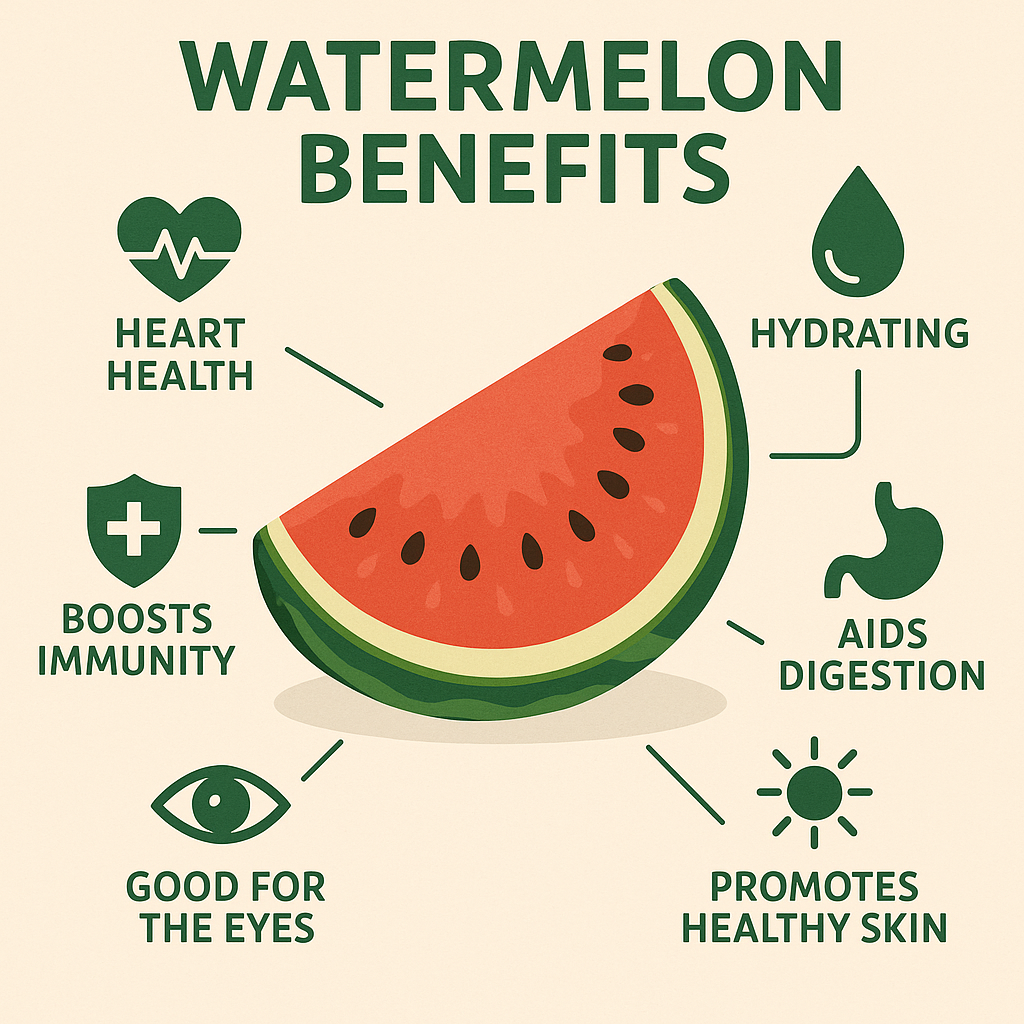
The Best Time to Eat Watermelon for Maximum Benefits
Watermelon — sweet, juicy, and incredibly refreshing — is a summer staple loved across the world. Beyond being a treat for the taste buds, it is packed with vitamins, minerals, antioxidants, and water.
Why Watermelon is a Superfood

Before we dive into the timing, it’s important to understand why watermelon deserves a spot in your daily diet:
- Hydration Booster: With about 92% water content, it’s a fantastic natural hydrator.
- Rich in Nutrients: High in vitamins A, B6, and C, as well as potassium and magnesium.
- Loaded with Antioxidants: Lycopene and cucurbitacin E help combat oxidative stress.
- Digestive Friendly: Contains small amounts of fiber to support digestion.
- Heart Health: Lycopene and citrulline in watermelon are associated with improved heart function.
The Best Times to Eat Watermelon
1. Mid-Morning Snack (9 am – 11 am)
Eating watermelon mid-morning is a smart move. During this time, your digestive system is active and can easily process the fruit. Plus, its high water content can keep you energized and prevent dehydration as the day warms up.
Tip: Eat watermelon on an empty stomach or at least 2 hours after your breakfast for better digestion.
2. Pre-Workout Snack
Watermelon is a great pre-workout snack because it provides natural sugars for quick energy without feeling too heavy. Plus, the amino acid citrulline found in watermelon can help improve blood flow, which may enhance exercise performance.
Tip: Eat a small bowl of watermelon 30–45 minutes before your workout.
3. Post-Workout Refresher
After a sweaty workout, your body craves hydration and electrolyte replenishment. Watermelon’s water content, potassium, and natural sugars make it ideal for quick recovery.
Tip: Combine it with a handful of almonds or a source of protein for a balanced recovery meal.
4. Early Afternoon (before 4 pm)
If you’re craving something sweet after lunch, watermelon is a guilt-free option. However, avoid eating it too late in the day, especially after 6 pm, as its natural sugars might interfere with digestion or disturb your sleep.
Tip: Have it as a standalone snack instead of mixing with heavy meals.
When Not to Eat Watermelon
- Late Night: Eating watermelon late at night can burden your digestive system because of its high sugar and water content. It might lead to bloating or frequent trips to the bathroom.
- Immediately After Meals: Avoid eating watermelon right after heavy meals. It may slow digestion and cause discomfort.
Bonus: Best Ways to Eat Watermelon
- Fresh watermelon slices
- Watermelon mint salad
- Watermelon smoothies
- Watermelon popsicles
- Infused water with watermelon cubes
Just remember: fresh, ripe watermelon eaten mindfully at the right time can amplify its health benefits!
Bonus Tips for Eating Watermelon
Choose ripe watermelon: Look for a creamy yellow spot (field spot) and a deep hollow sound when tapped.
Store properly: Once cut, store watermelon in an airtight container in the fridge and consume within 2-3 days for the best taste and nutrient retention.
Eat fresh: Fresh, raw watermelon is always healthier than watermelon juices or processed watermelon products.
Stay moderate: Too much watermelon can cause a spike in blood sugar, especially in people with diabetes or insulin resistance. Stick to 1–2 cups per serving.
Key Nutritional Benefits Explained
1. Lycopene: The Red Wonder
- Lycopene is a powerful antioxidant that gives watermelon its red color.
- Helps reduce oxidative stress and inflammation.
- Linked to lower risks of heart disease, prostate cancer, and sunburn damage.
2. Citrulline: The Muscle Helper
- A rare amino acid that supports better blood flow and reduces muscle soreness.
- Helps in maintaining endurance during workouts and faster post-exercise recovery.
3. Vitamin C: Immunity and Skin Health
- Boosts immune function.
- Helps in collagen production for healthy skin and joints.
- Acts as a natural antioxidant to combat free radical damage.
4. Vitamin A: Vision and Skin
- Maintains healthy eyesight.
- Supports a glowing, moisturized skin texture.
5. Potassium: Heart and Nerve Balance
- Helps control blood pressure.
- Supports proper nerve signals and muscle contractions.
6. Magnesium: Calming Mineral
- Essential for energy production.
- Helps prevent cramps and supports bone health.

Conclusion
Watermelon is a wonderful fruit that offers hydration, nutrition, and natural sweetness. Eating it at the right time — preferably mid-morning, pre- or post-workout, or early afternoon — ensures your body digests and absorbs it efficiently. Skip late-night munching to avoid digestive discomfort and maximize the benefits of this incredible summer fruit.
Stay juicy, stay healthy!










